
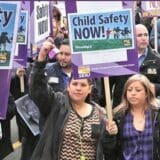
The gains won by Los Angeles County social workers during their strike last December were nothing short of historic. Members of the Department of Children and Family Services (DCFS), through the Children’s Social Workers union (part of Service Employees International Union Local 721), may have begun a sea change for children and families in the county. As the nation’s largest public child welfare agency, DCFS is now poised to be a bellwether for reform.
The job of the county’s social workers is to establish child safety, coordinate and evaluate visitation, substance abuse, mental health and domestic violence services; locate relative or foster care placements; prepare the children and transport them to placements; and for dependency court cases, prepare and write the court reports that are the basis for DCFS’ legal recommendations in legal proceedings.
As a former DCFS Supervising Social Worker, I believe that the high number of pre-strike caseloads severely hindered the ability of social workers to adequately provide services to maintain children at home or to reunify children with their parents and conduct thorough safety assessments.
» Read more about: DCFS Strike Gains: Protecting Children, Standing Up for Social Workers »
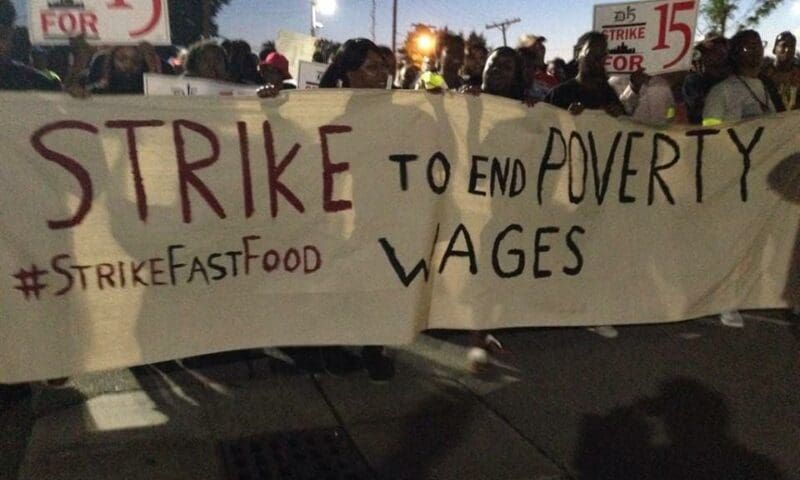
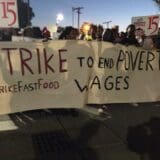
Seattle Mayor Ed Murray used last May Day to announce that business and labor had agreed to a historic plan to raise the minimum wage to $15 an hour. Seattle’s bold measure is part of a growing wave of activism and local legislation around the country to help lift the working poor out of poverty. The gridlock in Washington – where Congress hasn’t boosted the federal minimum wage, stuck at $7.25 an hour, since 2009 – has catalyzed a growing movement in cities and states.
The Seattle victory was a game-changer. Within months, politicians in other cities jumped on the bandwagon. San Diego city officials voted in August to adopt a $11.50 an hour by 2017. In San Francisco, which already has a citywide minimum wage, voters will decide in November whether to raise it to $15.
On September 24, the Los Angeles City Council voted by a 12 to 3 margin to require large hotels to pay at least $15.37 an hour to their workers.
» Read more about: A Movement Raises the Minimum Wage and Changes the Debate »
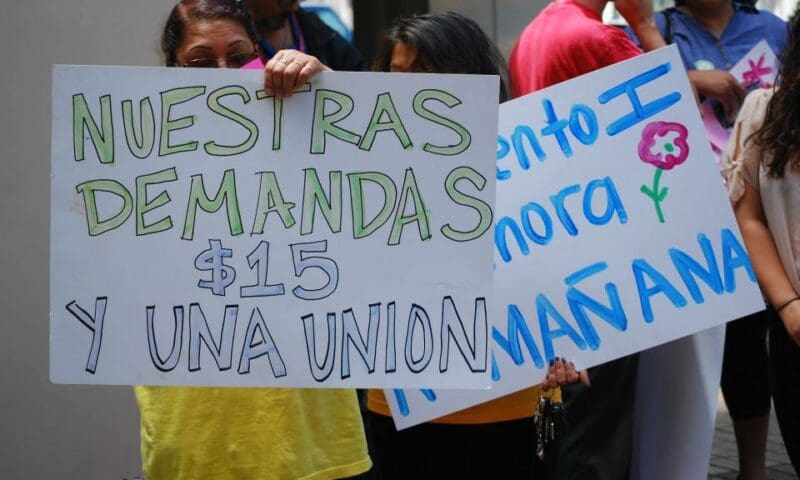
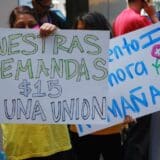
The recent Los Angeles City Council vote to raise hourly pay for 10,000 hotel workers to $15.37 could be part of an historic groundswell to create a new minimum wage across Los Angeles and beyond.
The Los Angeles City Council is expected to soon take up an introductory motion that would raise compensation for more than half a million employees throughout the city now laboring at California’s minimum $9 hourly standard.
Los Angeles Mayor Eric Garcetti, who rolled out the proposal on Labor Day with eight council members at his elbow, commissioned an impact study that calculates some 567,000 workers would benefit from the pay raise by 2017.
Garcetti has proposed a wage of $13.25 an hour, which would result in an annual wage boost of $3,200 per worker. Some advocates are pushing for a higher wage, as well as other provisions including paid sick days and strict enforcement to guard against wage theft.
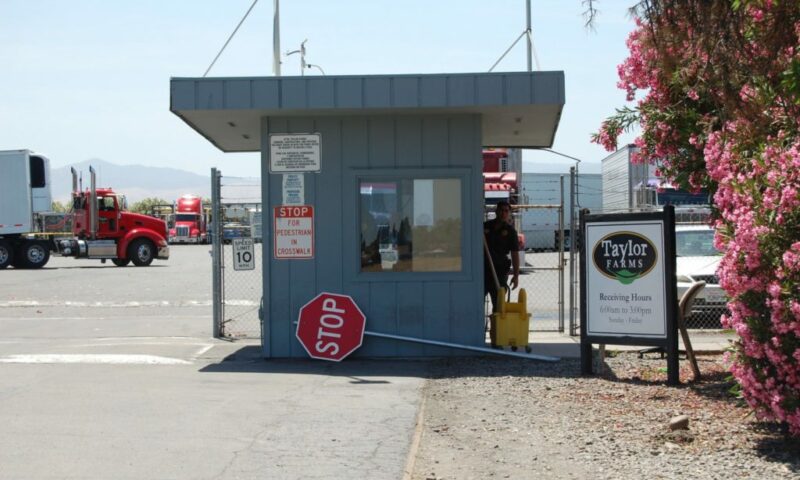

Governor Jerry Brown signed Assembly Bill 1897 into law Sunday, inaugurating what the bill’s author, Roger Hernandez (D-West Covina) described as “landmark legislation . . . to protect hard-working Californians who often times do not have a voice in the workplace.” The bill was drafted in response to the growing practice of corporations, particularly agriculture-based companies, to skirt state labor laws by relying on third-party contractors to hire employees and administer their wages.
Last May a Capital & Main report by Bill Raden and Gary Cohn documented how workers at the sprawling Taylor Farms vegetable and salad processing plant in Tracy were denied due-process rights along with health care and other employee benefits. (See “Ten Years a Temp: California Food Giant Highlights National Rise in Exploited Labor.”) Taylor Farms has claimed that workers at its facilities are temporary employees who work for various contracting outfits. Many of these employees have worked years for Taylor Farms and yet have had little chance for advancement.
» Read more about: Governor Brown Signs Employer Accountability Law »


I was inspired by the videos and photos of the more than 300,000 people at the People’s Climate March this past weekend in New York. The word is out, climate change is real, but what people might not know is the privatization of American infrastructure is contributing to the problem.
In a joint article with Professor Stephanie Farmer, I detail how poorly structured “public-private partnerships” (P3s) hinder efforts by cities and states to address climate change.
The city of Chicago is learning this the hard way. Not only has the decision to lease the city’s parking meters to a Morgan Stanley-led consortium been a costly mistake for taxpayers (the meters were sold $1 billion dollars under their value), Dr. Farmer’s research has also found that the deal is tying the hands of transportation planners in their efforts to construct environmentally sustainable transportation modes—such as bike lanes,
» Read more about: How Privatization Contributes to Climate Change »
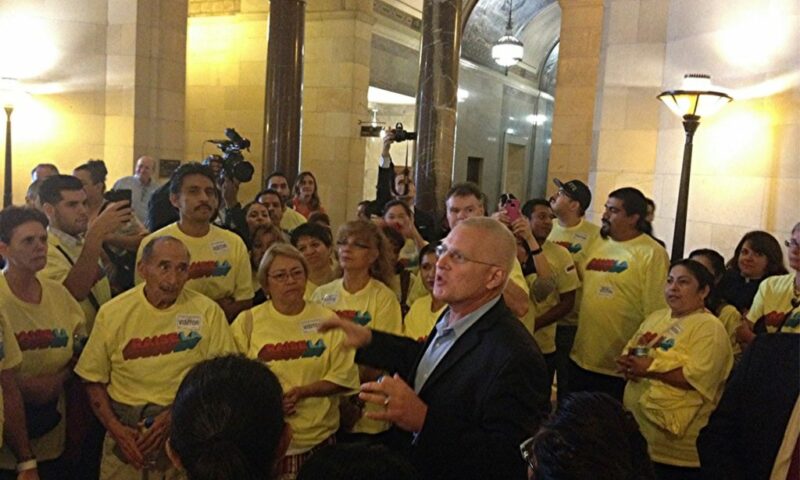
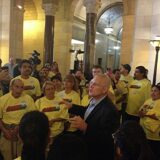
Amid cheers from labor and community supporters, 12 of the 15 Los Angeles City Council members voted Wednesday in favor of an ordinance that will raise the minimum wage for workers in large hotels to $15.37 per hour. The measure will apply to hotels with 300 rooms or more beginning in July 2015, and expand to hotels with 150 or more rooms one year later.
Prior to the meeting an eager crowd of activists and workers, dressed in yellow “Raise LA” T-shirts, gathered in the hall outside the chamber. Raise LA is the name of the movement behind the measure. After the item was introduced, councilmembers offered their views on the living wage ordinance. Councilmember Mike Bonin opened the comments with a statement about economic justice.
“A great unfairness is that people work full time for wages that do not bring them above the poverty line,” he said.
Members of the public then addressed the council,
» Read more about: L.A. City Council Passes Landmark Hotel Wage Ordinance »
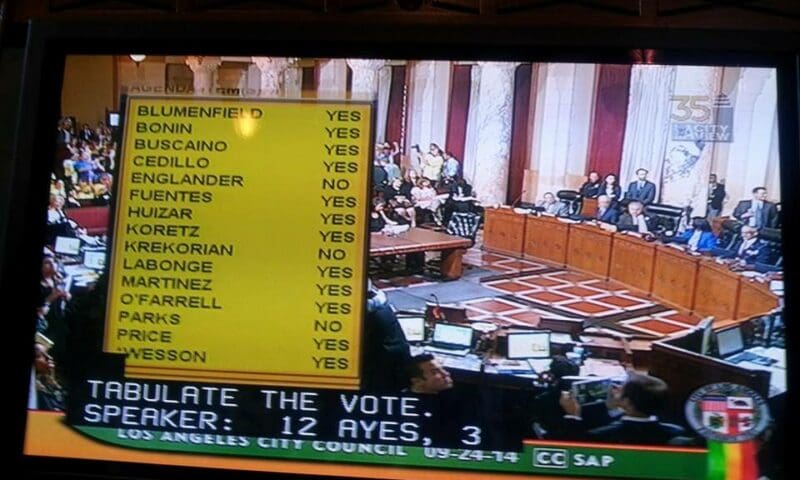
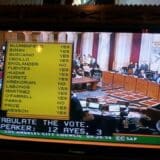
The Los Angeles City Council today voted to raise the minimum wage for workers employed by the city’s largest hotels. According to City News Service:
The council voted 12-3 to approve the minimum wage, with council members Bernard Parks, Mitchell Englander and Paul Krekorian dissenting. Because the decision was not unanimous, the issue will come back for a final vote Oct. 1. If approved, hotels with 300 or more rooms would need to start paying the $15.37 minimum wage by July 1 and those with at least 150 rooms would have to comply by July 1, 2016.
Capital & Main will post a detailed story of the historic vote later today.
» Read more about: L.A. Hotel Wage Hike Passes City Council »
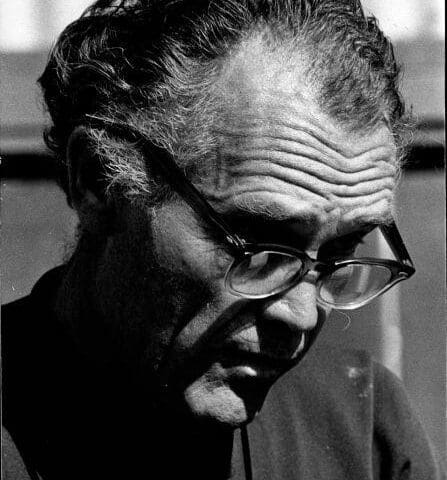
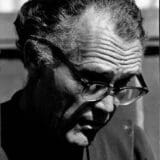
The police stop a young man. An officer shoots, killing him. The officer claims self-defense, that the killing was warranted.
The community, having endured years of unequal treatment at the hands of law enforcement and other municipal agencies, responds in anger. Protests ensue. Hard feelings persist, as do demands for law-enforcement accountability.
Sound familiar? No, this is not the case of 18-year-old Michael Brown in Ferguson, Missouri. The young man in question was Augustin Salcido, 17, and the incident occurred in Los Angeles more than six decades earlier. The Internet did not exist at that time and local television audiences were miniscule, so the Civil Rights Congress of Los Angeles produced a pamphlet, Justice for Salcido. In its introduction, author and civil rights advocate Carey McWilliams described the killing as part of a historical pattern of “continued suppression of the Mexican minority.”
Fred Ross,
» Read more about: Fred Ross, Cesar Chavez and Lessons for Ferguson »
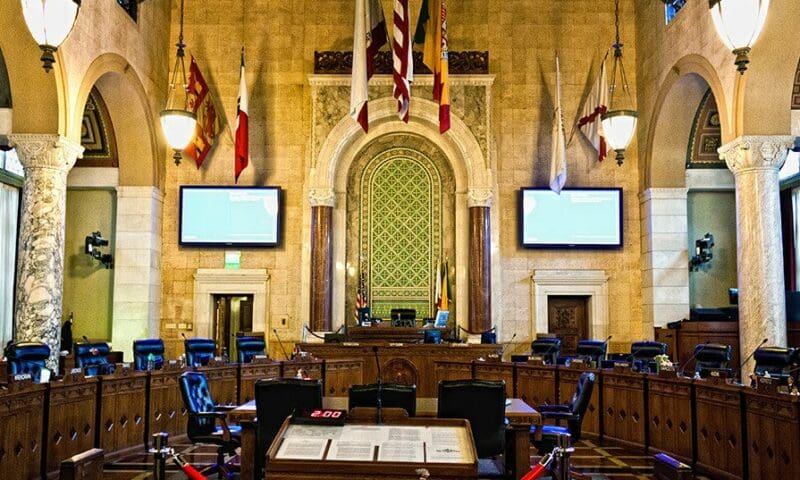

Thousands of low-wage workers in Los Angeles are poised to receive a substantial pay bump, depending on a critical City Council vote scheduled for Wednesday. On the table: a $15.37 hourly wage for hotel employees at some of the biggest and most lucrative non-unionized hotels in the City of Los Angeles.
In June a Los Angeles City Council committee directed city staff to draft an ordinance that would require hotels with 300-plus rooms to meet a $15.37 hourly wage benchmark by July 2015. Hotels with more than 125 rooms would have to meet the standard in 2016. The full council is expected to take up the proposal Wednesday morning after a Tuesday hearing at the Economic Development Committee.
Business interests complain that the measure would cost jobs, but proponents argue that tourism and the hotel industry are experiencing record growth and creating local jobs. A study prepared by the Economic Roundtable,


Sunday’s extreme heat didn’t prevent some 200-plus Angelenos from gathering in the Ann and John Nickoll Family Sanctuary at Temple Isaiah for an informal economic summit. The audience for this Westside event, partly sponsored by Bend the Arc, the American Civil Liberties Union and the Los Angeles Alliance for a New Economy, included District 5 Councilman Paul Koretz.
The crowd saw a screening of economist Robert Reich’s 2013 film Inequality for All. Narrated by Reich, this documentary provides some of the most incisive analyses of the causes of the income gap yet found in the popular media. The film is recommended viewing for anyone wanting to learn how the American middle class has become an endangered species.
But many in the audience had already seen the film and after the lights came up emcee Serena Zeise brought out the guest speaker and Reich friend, Harold Meyerson. The affable yet acerbic Myerson is a native son of Los Angeles who years ago moved east to become a Washington Post columnist and American Prospect editor-at-large.
» Read more about: Harold Meyerson on Economic Inequality’s Tipping Point »
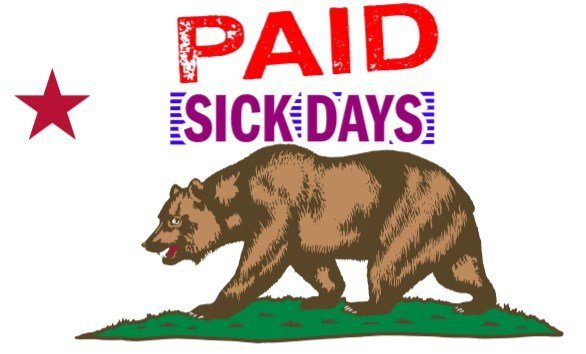
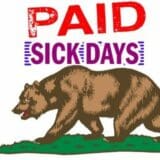
On September 10 Governor Jerry Brown signed Assembly Bill 1522 into law. The landmark legislation dramatically expands labor benefits for an estimated 6.5 million private-sector workers (including seasonal, part- and full-time employees), mandating they earn at least three paid sick leave days a year from their employers, effective July 1, 2015.
“AB 1522 is transformative,” the bill’s author, Assemblywoman Lorena Gonzalez (D-San Diego), told Capital & Main. Gonzalez, who chairs the Assembly’s Select Committee on Women in the Workplace, added: “If you look back in history California has always led the way in furthering workers’ rights, from the minimum wage to an eight-hour workday.”
Before Governor Brown signed AB 1522, about 39 percent of the state’s labor force earned no paid sick leave benefits. As a result many workers faced two undesirable options when ill: Stay home and lose pay, or show up to work and expose others,
Politics is the art of compromise. On this note, Capital & Main asked Assemblywoman Lorena Gonzalez (D-San Diego) about the removal of 365,000 In Home Support Service (IHSS) workers from Assembly Bill 1522, the paid sick leave bill she authored. (See “Landmark Sick Leave Law Signed.”) The measure, signed into law September 10, grants this employment benefit to 6.5 million private-sector workers statewide. It takes effect on July 1, 2015. IHSS workers help the disabled and elderly with their daily household and medical needs. According to the Economic Policy Institute, nationally 93 percent of such workers are female, with 27 percent of them Hispanic and 18 percent African American.
“At the end of the day,” Assemblywoman Gonzalez said, “we were forced to take that specific group out. “It was a condition of having the bill signed by Governor Brown. His view is that IHSS workers are in the middle of statewide bargaining,
» Read more about: Paid Sick Leave Law Excludes Homecare Workers »


Over a span of 20 summer days truck driver Daniel Linares had moved some 110 cargo containers at the Ports of Los Angeles and Long Beach for Pacific 9, a drayage company based in Carson.
Linares’ August 15, 2014 check showed his gross earnings to be $3191.87. But another line item on the check stub offered a nasty payday shock: By Pac 9’s calculations Linares owed the company $296.47. In other words, he had received a “negative” paycheck.
Pac 9, a company whose “180-plus independent drivers” annually deliver more than 100,000 containers from Southern California’s ports and whose “customer list includes many of the most recognizable Fortune 100 companies,” according to the company website, had handed Linares the bill for the insurance, registration and other expenses incurred for the truck he leases from the company. He had already paid up-front for its fuel.
» Read more about: Port Truck Drivers Receive “Negative” Paychecks »


There has been increased attention recently paid to America’s vast infrastructure needs. The White House, in conjunction with the Treasury and Transportation Departments, even held a summit this week to bring together key leaders from state and local governments, as well as private sector investors, to discuss best practices for increasing investment in infrastructure projects in our communities.
We know that rebuilding America can be an effective way to rebuild our economy as well, but only if the deals are designed in a way that truly reflects the needs of our neighbors and our neighborhoods. That’s why we at In the Public Interest developed the Infrastructure Justice framework, a useful document for anyone who wants to ensure the investments that fund infrastructure projects meet the true infrastructure needs of our communities and help build the middle class.
By carefully evaluating public-private partnerships (P3s), and negotiating to include best practices for transparency,
In this uncertain post-recession era, economic inequality seems to be the only thing you can count on being in full supply. It’s certainly a subject that’s increasingly on people’s lips – thanks in no small part to Jacob Kornbluth’s 2013 documentary, Inequality for All. The film, wryly narrated by economist Robert Reich, lays out Reich’s astute perspective on how our country has arrived at the point where 400 Americans own more wealth than the entire bottom half of the country combined.
Sunday the Southern California Chapter of the American Civil Liberties Union will screen Inequality for All, an event that will serve as a refresher course for some and an eye-opener for others who have not seen the film. Afterwards, Harold Meyerson, American Prospect editor-at-large and Washington Post columnist, will offer his always lively insights into what’s happened since the documentary’s premier, along with a discussion of commercial property tax reform.
» Read more about: Harold Meyerson Speaks on ‘Inequality for All’ »


Among the puffier news stories making the rounds today has been Monday’s unveiling of a portrait of former Governor Arnold Schwarzenegger by painter/photographer Gottfried Helnwein. (The artist’s other subjects have included singer Marilyn Manson and Schwarzenegger’s fellow Austrian, Adolf Hitler.) The portrait is a giant, hyper-realistic yearbook image of a smiling Schwarzenegger, backgrounded by a ghostly outline of California’s state seal. It will hang in the Capitol next to a wildflower landscape occupied by a more modestly proportioned Gray Davis, the man Schwarzenegger replaced after the 2003 recall election.
It’s worth remembering that Davis didn’t lose his job because he was some corrupt autocrat along the lines of Louisiana’s Huey Long. Instead, he was the collateral damage from a Texas-sized conspiracy led by energy trader Enron to hike up the cost of electricity for Californians. The resulting budget crisis and public backlash led to a celebrity coup in which frustrated citizens were allowed,


Today is a big day for Lionsgate Entertainment, and we want to help celebrate. That’s why on the occasion of the annual shareholder’s meeting of this hugely successful film company (taking place right now in Toronto), AFM musicians are proud to present a musical tribute to Lionsgate and its executive leadership – a little number we call “Right Here at the Top.”
AFM musicians created the song as part of our efforts to draw attention to Lionsgate’s destructive offshoring of musical scoring work, even as it simultaneously takes millions in tax dollars — moneys intended to enrich our communities. Of course the story told by the CEO in our song may not be exactly the story told by Lionsgate’s executives to their shareholders. But wait –– what’s that? The executives at Lionsgate fail to provide important information to their beloved shareholders?
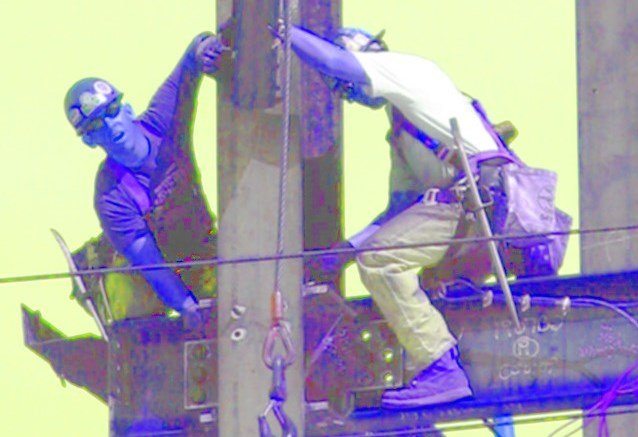
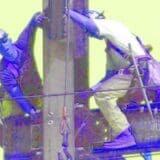
Readers of Capital & Main are all too familiar with wage theft and job misclassification – twin plagues that afflict American workers, especially truck drivers at the Los Angeles and Long Beach ports. Employers use wage theft to shortchange employees out of their wages and benefits by shaving hours off time cards; job misclassification, on the other hand, allows companies to deny that the people working for them are even employees at all, but freelancers who are ineligible for government-provided benefits such as unemployment insurance and workers’ compensation. By misclassifying their workers, employers do not pay the kinds of payroll taxes that provide these and other services to workers.
Now, thanks to an epic investigative series published yesterday by the McClatchy news syndicate (publisher of the Sacramento Bee), in partnership with ProPublica, these two issues have been pushed before a national audience.
» Read more about: News Series Exposes Massive Employer Fraud in Construction »


In 2012 California’s construction industry took in a respectable $152 billion, employed nearly a million workers and is now projected to grow 26 percent by 2020. But according to a recently released report, a pall is threatening to settle over this otherwise bright horizon. Sinking Underground: The Growing Informal Economy in California Construction identifies an ever-expanding segment of workers in the industry who are not reported by their employers or are misclassified as independent contractors—characteristics of the “informal economy,” or what is more commonly referred to as an underground economy.
The study’s disturbing research suggests that informal construction, which benefits the state’s unscrupulous labor brokers and contractors, and the real estate developers who hire them, is partly responsible for the hollowing out of California’s middle class.
Sinking Underground was conducted by the Economic Roundtable and tracked labor statistics from 1972 to 2012.
» Read more about: Study: Cheaters Prosper in State’s Informal Construction Economy »


Whenever the subject of raising hourly pay to a livable level comes up in Los Angeles, you can expect two stalwart foes: The Chamber of Commerce and the Central City Association. They both represent business and they always argue that paying working people a wage they can live on will hurt business owners. I cannot recall a time they ever claimed anything else.
But now a new voice from the business community has surveyed the field of low-wage work and come up with a conclusion quite opposite the Chamber’s and the Association’s. A member of the faculty at MIT’s Sloan School of Management (named after a former president of General Motors, no less) compared wages and company results among sales people and check-out clerks. These jobs happen to rank one and two in the number of employees in the country, and they are notorious for low pay, part-time hours and oppressive working environments.